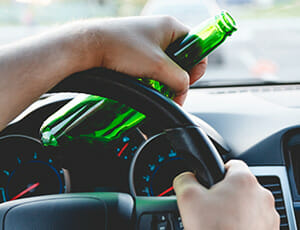Injured by a Drunk Driver? We Can Help.
According to the Texas Department of Public Safety, in 2014, police arrested 70,569 people for driving under the influence of alcohol. Often, these types of arrests occur because people misjudge their own level of intoxication and presume they can drive safely.
Alcohol impairs judgment and perception, so drivers who have been drinking may make critical mistakes, like drifting into another lane, running a red light, or mistaking a highway exit for an on-ramp. And all too often, intoxicated drivers cause serious and fatal crashes.
DUI & DWI in Austin, TX
In Texas, a person with a blood alcohol concentration (BAC) of .08 percent or higher is considered legally intoxicated. Most drivers who cause serious and fatal DUI crashes have a BAC that’s much higher than that. Of intoxicated drivers involved in fatal crashes in the United States in 2014, 56 percent had a BAC of .15 percent or higher.
According to the National Highway Transportation Safety Administration, a person with a BAC of .15 percent will exhibit “major loss of balance” and poor muscle control. Those factors, combined with alcohol’s impairment of visual and auditory processing, raise the risk of a crash.
Texas ‘Dram Shop’ Laws
The term “=dram shop laws” applies to Texas laws that define liability for serving alcohol to minors or to obviously intoxicated persons.
Texas Alcoholic Beverage Code Section 2.02 states that a party host can be found liable, if the host provides car keys to a guest who is intoxicated and that guest then causes a crash in which injuries occur. Hosts could also be found liable if they knowingly serve alcohol to a minor and the minor causes a crash resulting in injuries.
In commercial establishments, bartenders, servers, and owners could be found liable, if the following facts are established:
- A customer was obviously intoxicated
- An employee continued to serve alcohol to that customer
- The customer crashed after leaving the establishment, due to intoxication
- The crash resulted in injuries.
Businesses that serve alcohol may also be found liable for an injury crash, if they knowingly served alcohol to the minor that caused the crash. The law does not state that liability hinges on the minor’s being obviously intoxicated and does not penalize businesses that had no “actual knowledge” of the minor’s age.
When a driver causes a serious accident and police determine the driver was intoxicated, the Texas Alcoholic Beverage Commission launches a source investigation. If the TABC finds that a provider of alcohol acted illegally, it prepares criminal charges against the provider.
The Greater Austin Underage Drinking Prevention Council features several stories of bars and restaurants that were sued after a fatal DUI crash. In one instance, an insurer for On the Rox Sports Bar and Grill in Montgomery County paid $1 million to the only survivor of a head-on crash and to the families of the two people killed in the crash. The driver who caused the crash had been drinking at the sports bar and had a BAC of .286 at the time of the accident.
If you’ve been injured in a crash with an intoxicated driver and the cause of that driver’s intoxication was the irresponsible service of alcohol, you may be able to pursue a liability claim against the alcohol providers.
The Dangers of ‘Buzzed’ Drivers
Even after consuming only one drink, drivers may be at greater risk for a crash, according to a recent study. Researchers at the University of California studied crash data from 1994 to 2011 and found that drivers with a BAC of .01 percent were 46 percent more likely than sober drivers to be found solely responsible for a vehicle crash. One of the researchers in the study said there is no bright line that defines drunk and not-drunk – while .08 percent may be the legal threshold for intoxication, driving with a BAC of .07 percent or lower could be just as dangerous.
If you believe an intoxicated driver is responsible for your crash-related injuries, we want to hear from you. Get your free, no-obligation consultation today. Call the Evans/Reilley Law Firm at (855) 414-1012, or fill out our online contact form.

 Serving Clients Throughout Texas
Serving Clients Throughout Texas


 Chip Evans is a partner at Evans & Herlihy. Chip brings to the firm more than 20 years of experience as a trial lawyer representing Plaintiffs. It is the desire to help individuals, not corporations, that attracts Chip to this side of the docket. [
Chip Evans is a partner at Evans & Herlihy. Chip brings to the firm more than 20 years of experience as a trial lawyer representing Plaintiffs. It is the desire to help individuals, not corporations, that attracts Chip to this side of the docket. [ 







